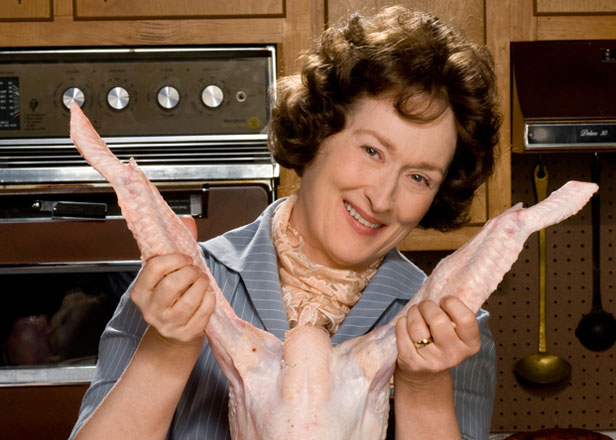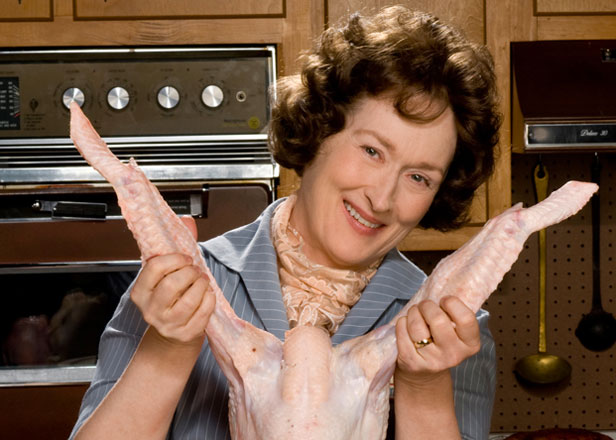 Big bird: Meryl Streep as Julia Child in “Julie & Julia.”(Sony Pictures)On Sunday, veteran actress Meryl Streep has a chance to take home her third Oscar, for portraying Julia Child in Nora Ephron’s film “Julie & Julia.” (It’s Streep’s 16th nomination.) As charming as Streep is as the towering, funny-voiced woman who revolutionized American cooking, she deserves more accolades for another role she has played in the history of food in America: that of longtime activist.
Big bird: Meryl Streep as Julia Child in “Julie & Julia.”(Sony Pictures)On Sunday, veteran actress Meryl Streep has a chance to take home her third Oscar, for portraying Julia Child in Nora Ephron’s film “Julie & Julia.” (It’s Streep’s 16th nomination.) As charming as Streep is as the towering, funny-voiced woman who revolutionized American cooking, she deserves more accolades for another role she has played in the history of food in America: that of longtime activist.
Over at the Natural Resource Defense Council’s site Simplesteps.org, Wendy Gordon interviews Streep about her involvement in the environmental and food movements. The two women have known each other since they worked together to publicize the NRDC’s March 1989 report about weaknesses in the regulation of pesticides used in food production. That report launched what was known as the “Alar scare,” the national stampede toward the then-nascent subset of organic agriculture. Streep and Gordon helped create Mothers & Others, a now-defunct group that fought for tougher pesticide residue standards — and eventually saw them passed into law 10 years later. They didn’t stop there, writes Gordon:
We encouraged stores to stock organic products, shoppers to support farmers’ markets and CSAs. We distributed lists of rBGH-free milk and safer food and beverage storage containers. We published dozens of product reports on everything from paints and wood finishes to personal care products, home furnishings and children’s toys. Mothers & Others was transformational, using the power of the concerned consumer to change the marketplace, everything from the way we grow our food to the way we make our stuff. And Meryl was a transformative leader in the environmental health and green consumer movements. She connected the dots for people, brought it home, made it personal.
In the interview, Gordon recalls how industrial agriculture launched a disinformation campaign, led by Elizabeth Whelan and the American Council for Science and Health, that questioned the science behind NRDC’s report on pesticides in the diet of infants and children. And quite shockingly, Streep mentions that Julia Child played a role in it:
I never met [Child], but enlisted her aide in this whole sustainable ag question, and pesticide residues, and everything else, and she was extremely dismissive. She actually was a mouthpiece for Elizabeth Whelan’s group. I said that ACSH was a front for industry, agrichemical industries, everybody not necessarily looking out for America’s health and welfare. She [Julia] went nuts. She was mad, she said “well buh buh buh, this is not a front for industry, we have many reputable scientists on our board,” and blah, blah blah, you know saying the same old thing that isn’t true.
We also learn that Streep set up a Community-Supported Agriculture program for a farm when she was living in Connecticut, and continues to buy mostly organic and local food — she’s a farmers market shopper, and buys grass-fed beef. She’s educating herself about the science behind and controversies around genetically modified foods. And while it’s hard to know what the cranky Child might have made of such concerns, Streep thinks that ultimately Child’s legacy is that of “real food” — that butter and lard are just fine, “as long as it’s a little bit. Moderation and portion size, portion size, portion size – that’s the difference, that’s the whole thing. It’s all about moderation, and real food, you know food that is recognizable.”



